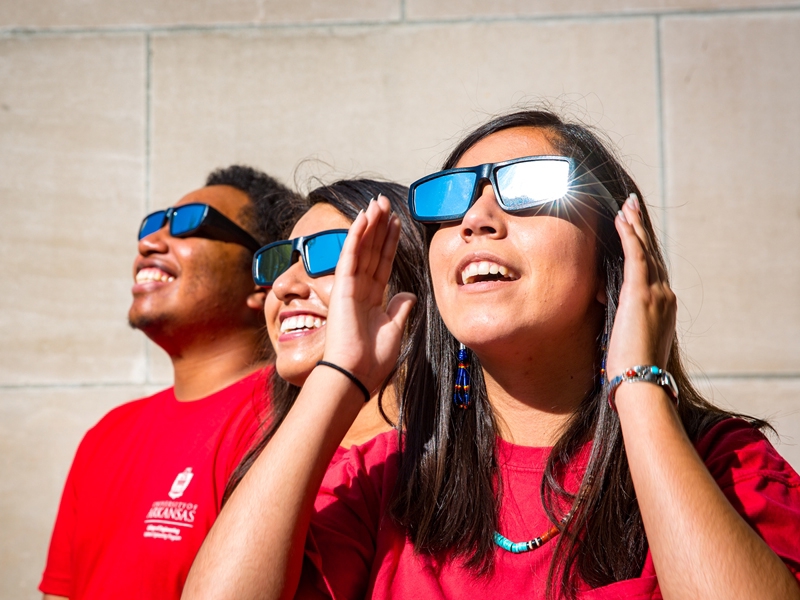On Monday, April 8, a partial eclipse of the sun will be visible on the U of A campus, and for much of the state of Arkansas, a total eclipse will occur. Approximately 1.5 million individuals are projected to journey to the state to witness the eclipse, and many are expected in the Northwest Arkansas area.
The moon will partially eclipse the sun from 12:32 p.m. to 3:09 p.m. as viewed from campus, with maximum coverage at 1:51 p.m.
To celebrate this unique and extraordinary astrological event, the campus community is encouraged to gather around 1:30 p.m. on April 8 at the Chi Omega Greek Theatre to view the eclipse. There will be a small number of special eclipse viewing glasses available at this event. University Housing has already distributed more than 8,000 eclipse glasses to its residents and staff. These glasses were purchased by the Arkansas Space Grant Consortium.
The Arkansas Department of Health has created an eclipse webpage with public health and safety information in preparation for the solar eclipse. Below are some helpful tips to remember before the day of the eclipse.
Safety Tips for Viewing the Eclipse
- Looking directly at the sun can damage the back of the eye (the retina) and lead to a condition known as solar retinopathy. If the damage is caused during an eclipse, it is known as eclipse retinopathy.
- Cover your eyes with your eclipse glasses or a solar viewer before looking up at the sun. Ensure that they are certified to meet the ISO 12312-2 international standard for safe direct viewing of the sun.
- Do not look directly at the sun without proper eye protection when any part of it is visible, even a sliver.
- Do not look at the sun through a camera, a telescope, binoculars or any other optical device while using your eclipse glasses or hand-held solar viewer — the concentrated solar rays will damage the filter and enter your eye(s), causing serious injury.
- If you normally wear eyeglasses, put your eclipse glasses on over them, or hold your handheld viewer in front of them.
- Ordinary sunglasses should not be used as a replacement for eclipse viewing glasses or handheld solar viewers.
- You can learn more about safe viewing.
ARKANSAS CENTER FOR SPACE AND PLANETARY SCIENCES
The day of the eclipse has been circled on calendars for much of the last year, with many seeking out more information about “the final frontier” than ever before.
The Arkansas Center for Space and Planetary Sciences, located on the U of A campus, has become one of the premier training grounds for NASA-bound scientists.
Current research in the center spans topics such as water on Mars, astrobiology, atmospheric processes on Venus, ices on Pluto and other ice worlds, planetary geomorphology, galactic and extragalactic astronomy, extreme-temperature electronics, small spacecraft development and operations, remote sensing, and meteorite and impactite analysis.
Check out the links below to learn more about the center, some of the students and faculty involved, research that is happening right now and even some fun facts about the eclipse:
- Determined: Embracing the Unknown
- Short Talks: A ‘Literally Awesome’ Phenomenon
- Discover RED: Eye of the Eclipse
- Short Takes: Give Her Space
- Researchers at Center for Space and Planetary Sciences Study Other Worlds to Understand Ours
- Barbie of NASA: Shelby Osborne
- The Sky's the Limit: Amber Straughn
- Arkansas Center for Space and Planetary Sciences
Either a total or partial eclipse will be seen across the entire state. Various members of the campus community will be viewing the moment, from Fayetteville to Garvan Woodland Gardens. Check out the map below that shows the path the moon will take on that day.
Topics
Contacts
Christopher Spencer, assistant director for marketing and strategic communications
University Housing
479-575-5084,
John Thomas, director of media relations
University Relations
479-575-7430,
Breeanne Carter, assistant director of marketing and communication
Pat Walker Health Center
479-575-7396,
